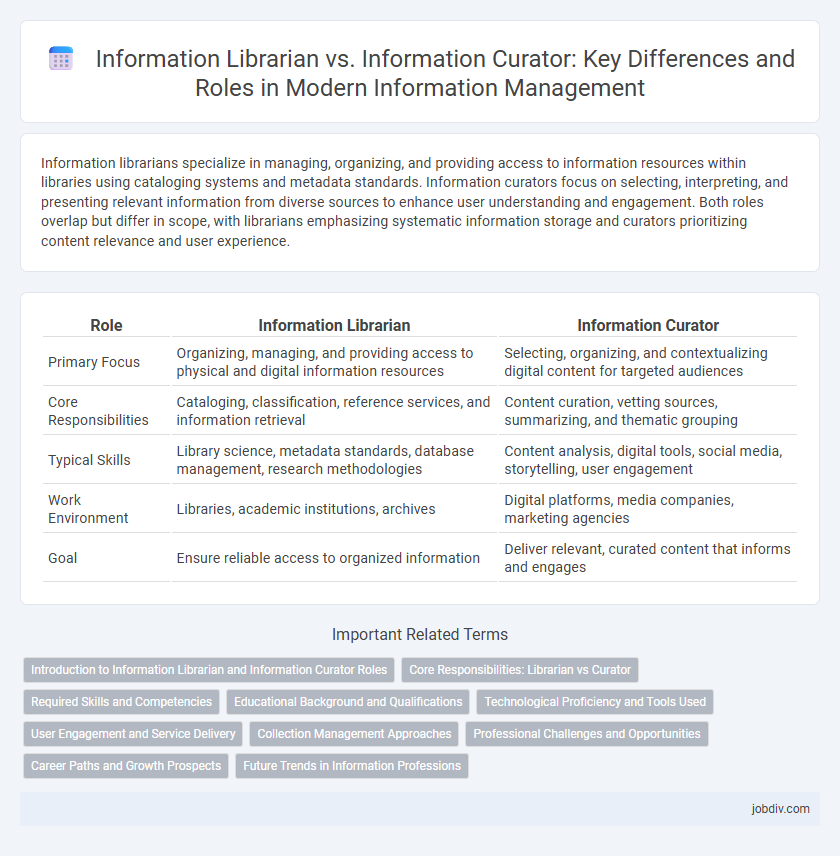Information librarians specialize in managing, organizing, and providing access to information resources within libraries using cataloging systems and metadata standards. Information curators focus on selecting, interpreting, and presenting relevant information from diverse sources to enhance user understanding and engagement. Both roles overlap but differ in scope, with librarians emphasizing systematic information storage and curators prioritizing content relevance and user experience.
Table of Comparison
| Role | Information Librarian | Information Curator |
|---|---|---|
| Primary Focus | Organizing, managing, and providing access to physical and digital information resources | Selecting, organizing, and contextualizing digital content for targeted audiences |
| Core Responsibilities | Cataloging, classification, reference services, and information retrieval | Content curation, vetting sources, summarizing, and thematic grouping |
| Typical Skills | Library science, metadata standards, database management, research methodologies | Content analysis, digital tools, social media, storytelling, user engagement |
| Work Environment | Libraries, academic institutions, archives | Digital platforms, media companies, marketing agencies |
| Goal | Ensure reliable access to organized information | Deliver relevant, curated content that informs and engages |
Introduction to Information Librarian and Information Curator Roles
Information librarians specialize in organizing, managing, and providing access to information resources within libraries, ensuring efficient retrieval and user support. Information curators focus on selecting, organizing, and maintaining digital content and metadata to enhance discoverability and user engagement across various platforms. Both roles require expertise in information management but differ in scope, with librarians emphasizing physical and digital resource accessibility and curators prioritizing content relevance and contextualization.
Core Responsibilities: Librarian vs Curator
Information librarians manage, organize, and maintain extensive collections of data and resources, ensuring easy access and retrieval for users. Information curators focus on selecting, interpreting, and presenting data with contextual relevance to enhance user understanding and engagement. Librarians typically prioritize systematic cataloging and preservation, while curators emphasize thematic storytelling and content enrichment.
Required Skills and Competencies
Information librarians require strong organizational skills, proficiency in cataloging systems, and expertise in information retrieval and reference services to efficiently manage library resources. Information curators need advanced analytical abilities, knowledge of digital content management, and competency in metadata standards to select, classify, and present relevant information effectively. Both roles demand excellent communication skills and adaptability to evolving information technologies.
Educational Background and Qualifications
Information librarians typically hold a Master's degree in Library Science (MLS) or Information Science, emphasizing cataloging, classification, and information retrieval skills. Information curators often have diverse educational backgrounds including degrees in digital humanities, museum studies, or archival science, with specialized training in content management and metadata standards. Both roles require strong technical proficiency, but curators may focus more on digital asset management and user engagement strategies.
Technological Proficiency and Tools Used
Information Librarians specialize in managing digital catalogs, databases, and integrated library systems, utilizing tools like MARC records and library management software to organize and retrieve information efficiently. Information Curators focus on aggregating, annotating, and contextualizing digital content using advanced content management systems, metadata standards such as Dublin Core, and data visualization tools to enhance user understanding. Both roles require strong technological proficiency, but curators often engage more deeply with data analytics and digital storytelling platforms to create meaningful narratives from information.
User Engagement and Service Delivery
Information librarians specialize in organizing, managing, and providing access to information resources, emphasizing efficient user engagement through personalized assistance and resource discovery. Information curators focus on selecting, contextualizing, and presenting information to enhance user experience and knowledge retention, often through curated collections and digital platforms. Both roles prioritize service delivery by tailoring information access to user needs, though librarians typically facilitate access to broader information ecosystems while curators craft targeted narratives and thematic experiences.
Collection Management Approaches
Information librarians employ systematic collection management approaches emphasizing cataloging, classification, and user accessibility to ensure organized retrieval of resources. Information curators focus on selective acquisition and contextual organization, enhancing the thematic coherence and interpretative value of collections. Both roles prioritize resource relevance but diverge in methodologies--librarians optimize structured indexing, while curators emphasize narrative-driven assemblage.
Professional Challenges and Opportunities
Information librarians face challenges in managing vast amounts of data while ensuring user accessibility and data accuracy, often navigating evolving digital technologies and privacy concerns. Information curators encounter opportunities in selecting, organizing, and presenting content with a focus on relevance and context, requiring strong analytical skills and subject expertise. Both roles demand continuous adaptation to information management trends and collaboration with multidisciplinary teams to enhance knowledge dissemination and user engagement.
Career Paths and Growth Prospects
Information Librarians specialize in organizing, managing, and providing access to information resources within libraries, focusing on cataloging and user services, with career growth typically involving roles like senior librarian or library director. Information Curators concentrate on selecting, preserving, and interpreting digital and physical information content, often working in museums, archives, or digital platforms, with advancement opportunities in digital asset management and specialized curation roles. Both career paths demand strong research and technology skills, but Information Curators may experience faster growth due to increasing digital data needs and evolving content management technologies.
Future Trends in Information Professions
Information librarians are increasingly integrating artificial intelligence and machine learning to enhance data retrieval and user interaction, positioning themselves at the forefront of digital transformation in knowledge management. Information curators focus on the ethical organization and contextualization of digital content, addressing challenges related to misinformation and data provenance in evolving information ecosystems. Both professions converge on leveraging advanced technologies and data analytics to support personalized information services and facilitate efficient knowledge discovery in future information landscapes.
Information Librarian vs Information Curator Infographic

 jobdiv.com
jobdiv.com